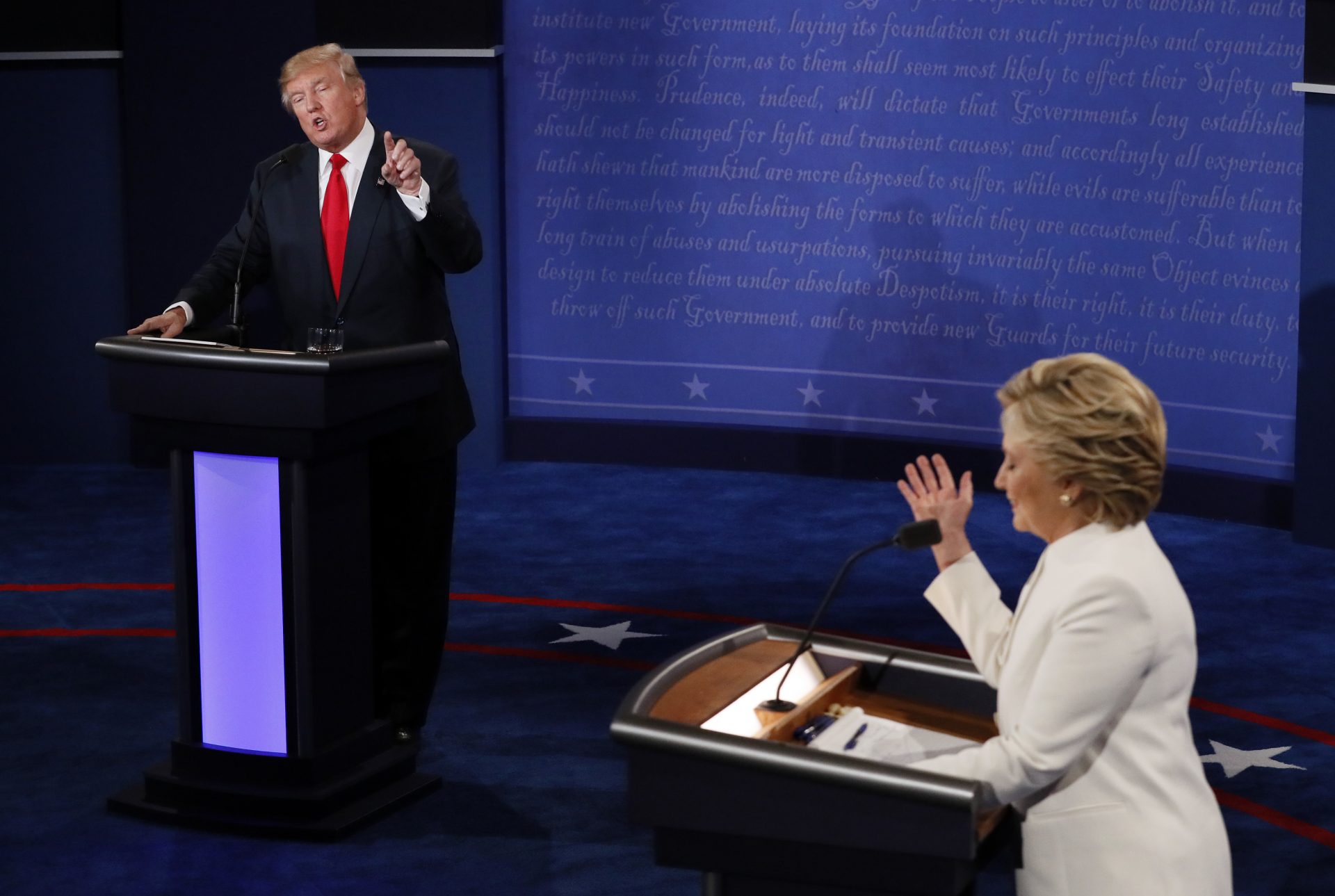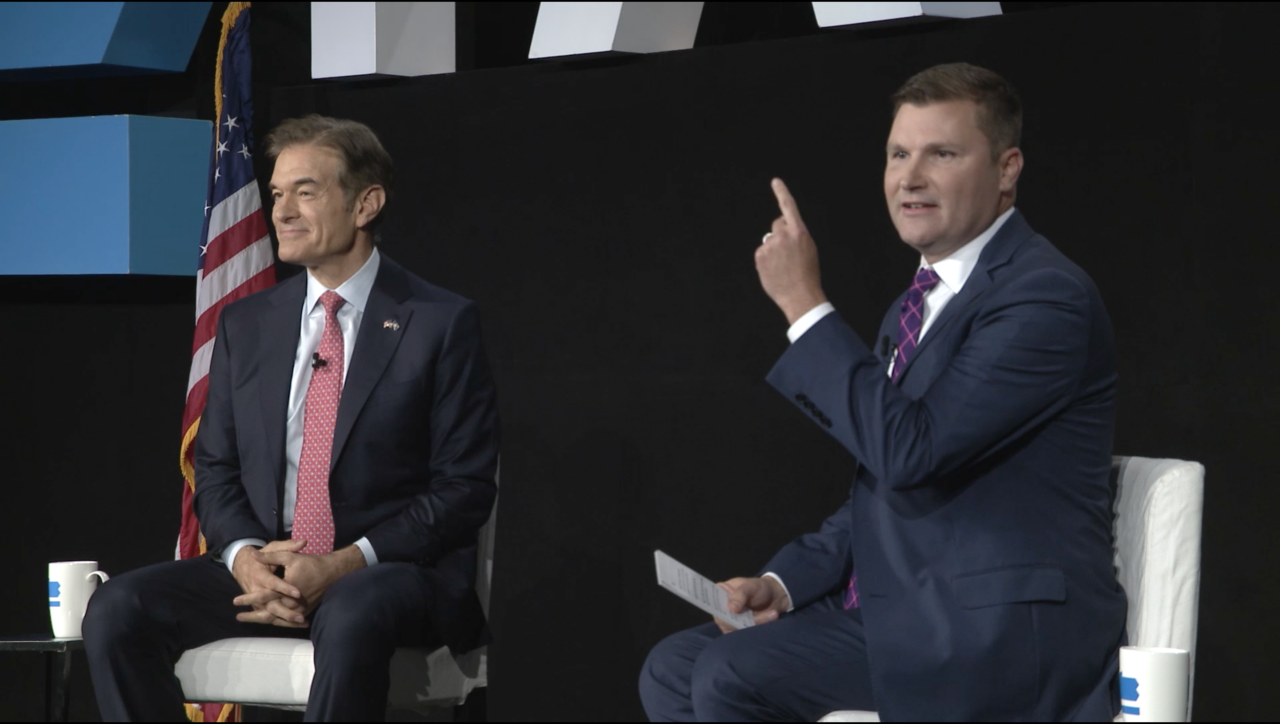
Meg Kelly / NPR

Meg Kelly / NPR

Meg Kelly / NPR
 WITF’s Sam Dunklau produced this story as part of the America Amplified initiative, using community engagement to inform and strengthen local, regional, and national journalism. America Amplified is a public media initiative funded by the Corporation for Public Broadcasting.
WITF’s Sam Dunklau produced this story as part of the America Amplified initiative, using community engagement to inform and strengthen local, regional, and national journalism. America Amplified is a public media initiative funded by the Corporation for Public Broadcasting.
This story is part of WITF’s pledge to put you, the voter, first in our election coverage — by engaging with you about issues important to your community and shining a light on them. Members of a texting club Sam set up as part of WITF’s collaboration with engagement platform Subtext pitched this story — and several are quoted.
To be successful, campaigns have always had to meet voters where they are. At one time, that meant coming up with songs touting their talking point. For a long time, it’s also meant going toe-to-toe on stages and in town halls against an opponent.
Over the years, political parties have called debates a time-honored American tradition. But during Pennsylvania’s 2022 campaign season, more candidates than not are driving a stake through the heart of the practice.
There’s no shortage of examples.
Republican state legislative and Congressional candidates bowed out of debates in Lebanon and Lancaster counties – one organized by an NAACP chapter, the other by the League of Women Voters. Notably, the candidates for governor have not debated because Republican Doug Mastriano wanted to choose his own moderators. He offered his opponent, Democrat Josh Shapiro, the chance to do the same, but he refused.
Though the U.S. Senate candidates have agreed to a single debate on Tuesday, Republican Dr. Mehmet Oz has criticized Democrat John Fetterman for refusing to spar with him at other venues.
But are voters losing out if a debate isn’t held? We put that question to several people who are preparing to cast ballots in the November election.
In the past, Michele Shapiro of Waynesboro in Franklin County (no relation to Democratic candidate for governor Josh Shapiro) made a point of watching candidates answer questions on their policy positions.
But, the 2016 presidential election changed her mind.
Then-candidate Donald Trump took a combative tone during a series of three debates and traded sharp barbs with his opponent, Hillary Clinton. At times, moderators had difficulty reining the two in.

Mark Ralston/Pool via AP
Democratic presidential nominee Hillary Clinton debates with Republican presidential nominee Donald Trump during the third presidential debate at UNLV in Las Vegas, Wednesday, Oct. 19, 2016.
“I can’t curse, [but] during the Trump debates, it was such a blank show, that I said, ‘This is crazy,’” Michele said. “It just seemed to me…like it was pointless. It’s become about whoever “wins” [the debate] and I really disagree with that.”
Since then, Michele – a Democrat – has tried watching other candidate forums. She tuned in to the debates between Republican and Democratic U.S. Senate candidates during the spring primary.
“I was just laughing. They were just absurd. They were attacking each other and there wasn’t much substance,” she said. “That’s not why you elect somebody. It’s not based on personality. It should be based on what they’re actually going to do.”
To her, it’s concerning that some candidates have bypassed debates, but on the other hand, she feels like the events haven’t been useful in helping her decide who to back.
“I’m not sure they really put themselves out there. It’s all talking points, so I’m not sure you’d learn something new about them,” Michele added.
All of this has led her to the realization the traditional debate style has run its course.
Some of the candidates topping the ticket this November appear to have reached the same conclusion. Take the PA Chamber of Business and Industry candidate forum held earlier this month. The group has organized the event for years, aiming to give the business community the chance to compare candidates in major races.
However, only one candidate from each of the top two races — Democrat Josh Shapiro for governor and Republican Mehmet Oz for U.S. Senate — bothered to show up.
Chamber president and moderator Luke Bernstein mentioned the absences while questioning Shapiro.
“Your opponent is not here,” Bernstein began, “Ideally, we would be having a debate. If he were here, what would you ask him and why?”
“I don’t know, Luke,” Shapiro responded. “I think the real question is, ‘Why aren’t you here?’”
The Chamber later said Mastriano didn’t attend because he didn’t want to talk with a moderator he couldn’t choose.

PA Chamber of Business and Industry video
PA Chamber of Business and Industry President Luke Bernstein talks with Republican U.S. Senate candidate Dr. Mehmet Oz at a candidate forum on Oct. 3, 2022.
“The Pennsylvania Chamber invited all four campaigns to participate in a debate consistent with the independent terms we have followed for decades. Dr. Oz and Josh Shapiro agreed to those terms, while we did not get a response from John Fetterman. Doug Mastriano proposed his own debate terms,” PA Chamber spokesperson Jon Anzur said in a statement.
Fetterman, the Democratic U.S. Senate candidate, said he didn’t attend because the U.S. Chamber had already endorsed Oz. When Bernstein also questioned Oz about what he would ask Fetterman, the Republican used the opportunity to criticize Fetterman’s time as head of Pennsylvania’s Board of Pardons.
Mastriano and Fetterman’s avoidance of debates has raised concerns among voters like Gregory Young, an independent who lives in South Lebanon Township in Lebanon County.
“Avoiding a debate is almost a red flag,” he said.“Anybody running for an office at these levels should be able to take a question from anyone and have an informed answer to it.”

Gregory Young
Independent voter Gregory Young of South Lebanon Township, Lebanon County.
To Young, the question is whether the format – where candidates spar with each other on policy in front of TV cameras – actually helps voters like him make their choices. He said he and his two daughters find most of what they want to know about candidates online, well before Election Day.
He said while he plans to watch the debate between Fetterman and Oz, he’s not sure anything said on the stage will change his mind.
“Television leads to flash over substance,” Young said. “I think it makes for coverage and more screaming from either person, pointing out the flaws in another person’s candidate as opposed to saying, ‘Wow, I didn’t know they believed in that.’”
“Just give us the facts and respect us enough to have an opinion and make our own informed decision,” he added. “Don’t treat us like dummies. Don’t treat us like children.”
Communications strategist Nell McCormack Abom, who has advised governors including Democrat Bob Casey Sr. and Republican Tom Ridge, said candidates are often advised to play to the cameras. Dressing well and not flubbing over words can mean the world to influential groups who are watching. (Full disclosure: McCormack Abom formerly hosted WITF-TV’s Smart Talk).
“A candidate’s performance in a debate is not definitive, because like anybody, they can have an off-night,” she said. “But if they really flub it, then that would cause me concern.”
Like Michele Shapiro, McCormack Abom blamed the 2016 Trump/Clinton race for bringing about the downfall of debates. She said candidates are now emboldened to attack their opponents or avoid appearing at all.
“These formalities that we all used to agree on for all these top row offices…have all been upended, and it’s to our detriment,” she said. “That’s very frightening for those of us that believe in the credibility that these candidates should be able to have with the public.”
In the absence of debates this year, independent voter Tom Maiello of Myerstown has gone online to research candidates’ policies. But he’s disappointed Shapiro and Mastriano won’t be sharing a stage – and that Fetterman has agreed to only one debate.

Tom Maiello
Independent voter Tom Maiello of Myerstown, Lebanon County
“If you’re deliberately saying, ‘I don’t want to participate,’ I am less likely to vote for you because all that we get from people is their ads, and the ads have become more and more divisive and cutthroat,” Maiello said.
Maiello and Young both say they’d like to refresh the debate format — things like Zoom chats with voter groups, Twitter Spaces conversations or Facebook Live videos would all fit the bill. They argue voters should have the chance to talk with candidates directly and publicly.
Without some kind of candidate forum, Maiello cautions Pennsylvanians are missing something important.
“This is a dress rehearsal for what we’re sending you to do. It’s important that you have that experience and we can see that you can tap dance when you need to,” he said.
This year, only a few will attend the rehearsal.

Sometimes, your mornings are just too busy to catch the news beyond a headline or two. Don’t worry. The Morning Agenda has got your back. Each weekday morning, host Tim Lambert will keep you informed, amused, enlightened and up-to-date on what’s happening in central Pennsylvania and the rest of this great commonwealth.
The days of journalism’s one-way street of simply producing stories for the public have long been over. Now, it’s time to find better ways to interact with you and ensure we meet your high standards of what a credible media organization should be.